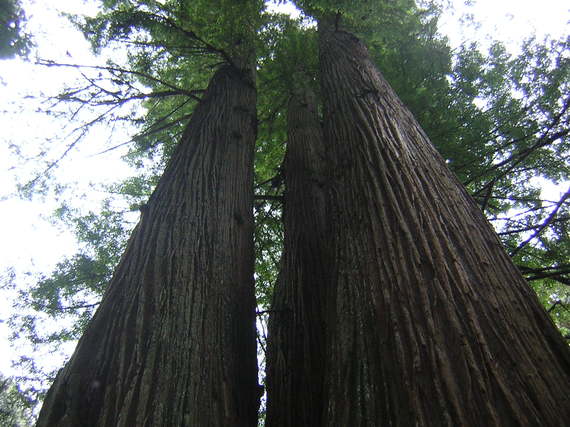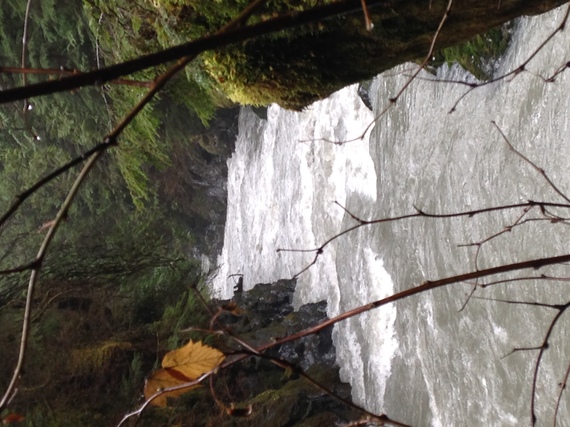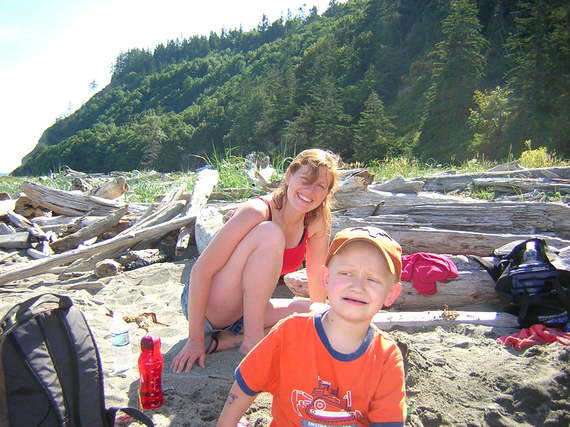In the fall of 2009 I bicycled through the California Redwoods. I had been cycling the Pacific Coast Bike Route for over a month. The Oregon Coast gave me steep climbs and long flats to build my strength as I cycled every other day, south towards the sun. I began that trip with no experience, no training, and my only guide was the painted white line in front of my tire. I had abandoned my home and my shattered life, with no guarantees that the road would provide for me--and with winter only days behind. My bicycle was laden with everything I owned in the world: camping gear strapped to the rack behind my seat, and four bags--called panniers--draped over the wheels. Inside them was a blue tarp to keep dinnertime dry at the end of the day, clothing to change into from my sweat-soaked riding clothes, enough food for three days, and rubber boots, coat, and pants to keep the rain and wind at bay during the storms that struck every few days.
The storms came and went like the cycles of my grief, and I was slowly transforming along with the season. But as I pedaled the narrow shoulders of California's Redwood Highway, I realized that I did not know what I was changing into. I had been a mother only three months before, but that identity died along with my son. The memories of Vasu's perfect hands, his wild sandy-blonde curls, and his infectious grin were already distant. I had to be content after his death, to live without answers while I learned to exist with grief. I became a wayward breeze, a rogue wave, spume that drifts on the shore. But the wilderness was not going to let me drift forever.
The forest commanded the road--the lanes were narrow and wound among giant tree trunks, following the course of a wide, shallow river. Logging trucks sped past, taking the curves with the carelessness of familiarity. On every outer curve was a turnout, but on every inner curve the shoulder narrowed, forcing me to cycle in the road to maintain my line. It was as I approached one of these inner curves that I heard the logging truck brake for the outer curve behind me.
Years before, someone had decided that the road here was too near the edge of a ravine. They had built a metal railing to keep wandering cars from veering over the brink. I was already beside the rail, my wheels to the left of the white line, my panniers protruded into traffic like the hand of a child catching the air from the back window of a car. I would be at the halfway point of the rail when the truck passed me--the narrowest part of the curve. The truck would have to merge into the other lane, to keep its side mirror from removing my head.
I was surprised how clearly I could think.
Another eighteen-wheeler appeared around the curve ahead of me. I thought it curious before three things clicked into place: 1) the trucks would meet on the narrowest part of the curve--if they swerved at all they would take out the entire road; 2) to my right was a painful tumble over the rail into the ravine; 3) I had to choose between the two.
For some reason I had all the time in the world to decide.
The driver behind me made his choice--to stay in his lane. It made sense to me that I must go, to save everyone else. I heard the truck beside my back wheel. The truck in the oncoming lane bellowed as it braked. I leaned to my right over the precipice. My right knee scraped the metal railing. I felt the wake of the first truck's mirror kiss my cheek. The draft of its trailer dragged me forward and sucked my bike and body back to vertical; then I was staring at its rear wheels and breathing its exhaust.
I had not jumped over the railing to save myself.
I continued on, suddenly aware that the only reason I moved forward was because the white line was still in front of my tire.
The river to my right danced and swirled, smoothing the stones and urging them towards the ocean. I traveled against the flow... but I was not alone. The river migrated with flashing scales and protruding jaws. I stopped at a turnout to watch the salmon spawn.
You are like us, they whispered. You move because to stop is to die.
But you move towards your death, I cried out.
Yes. We swim for continuance. We swim to die. We swim so that our children can live.
What do I swim for then? I wondered.
Do you desire a purpose beyond breathing? They slashed their tails through the rapids until they reached the slow deep pools beyond.
I do not want this emptiness anymore, if that is what you mean.
Not wanting things is not enough. To live, you must want.
I cannot have what I want. Cancer stole my desire.
Cancer took away your limitations. You may not have the reality you want, but that does not make what you have less meaningful.
I felt the sting of their reprimand, and swallowed hard against the anger that rose up. But where do I start? I have nothing and no one to make me happy. My son left me alone to face this world.
The salmon shimmered in the sunlight, their need and passion driving them against the will of gravity. No one is responsible for your happiness but you, they admonished. There are no answers. Only choices.
I do not know how to choose, I muttered.
You cannot live undecided. That is not life, that it is not death. You cannot live in-between. You must choose.
You are asking for me to do the impossible, I wailed. How do I choose to want life when I don't know how to want anything anymore? Always before, wanting was just there, until one day it wasn't.
Do you think that we choose our own deaths because we desire it? We choose to surrender to our existence. We choose this path against resistance, so that our purpose may continue beyond us.
But I do not know what existence I should surrender to. I do not know what purpose is beyond me, I cried out.
You do know, the fish whispered back. You know, but you do not want it to be hard. You wish to float downstream towards happily-ever-after instead of swimming upstream towards your own death.
I cycled away then, away from the intrusion of fish philosophy. I searched the damp forests for answers to the riddle. Until then I had been deliberately sleeping at almost every campground I found, so that I could take as much time as possible down the coast. But my legs suddenly wanted to push against the resistance of the road, and I passed many inviting campgrounds without a glance. I did not have time that day to climb the 2,000 foot hill between me and the California Coast Highway, but there was a campground just before. As the sun set, I cycled up to the entrance of the last camp at the end of the Redwood forests. I saw the warning sign long before I got close enough to read it. I stopped a few feet from the sandwich board, and its single word wandered around my head for meaning.
"Closed" it pronounced, as if a two foot by three foot piece of plywood could keep out the monstrous RV's that traveled the road with me. But I did not feel so large or confident as they. To me, the lone word was a command, as if my life were supposed to end right there. I leaned onto my handlebars, legs stiff on either side of my bike frame. There was no time left in the day. I could not turn back to the previous camp and get there before dark.
I stood in the cold air that bit at my fingertips and nose, paralyzed by indecision. Months before, as Vasu was dying, I had dreamed of cycling the coast because I thought it would limit my opportunities to live without purpose. If I had to cycle every day, then I would not choose to hide under the covers for the rest of my life. I wanted that road so that when I got lost within grief, purpose would find me. I chose to be alone with grief, but grief is a poor companion to have.
The road I had created to hold myself together was slowly tearing me apart.
The sun set and I snuck into camp in darkness. It was not a choice I wanted, but one I made reluctantly. I set my tent and wrapped myself in my sleeping bag like it were a coffin. But as I fell asleep I realized that I was not afraid of being caught trespassing. Rather, it was the emptiness of the campground that made me shiver, though I was not cold. In my desperation to be alone with my grief, I had forgotten that the reason I grieved was because I desired love.
I woke the next day with the answer to my riddle.
What I wanted was what I had always wanted: to love and be loved. Vasu made love look easy. Every day he loved me, wildly, willfully, passionately. I wanted to feel that again. I wanted to be connected to another human, the way Vasu connected to me.
I mounted my bicycle, turned my face to the rising sun, hopeful that the road ahead would lead to love.
Elea Acheson continued to ride for another month, connecting with the people she met. She is currently bicycling a 12,000 mile solo tour circumnavigating the USA, taking with her the knowledge she learned from her son's life and death, and the love she discovered exists everywhere. It it a quest to find the many roads to kindness. She travels solo, but she is not alone. Every road she takes there are people who care, people like you reading this, people who also desire to connect. Please join her through her writing here, and at her online travel journal here. And if this quest intrigues you please consider donating to her ride at Go Fund Me


